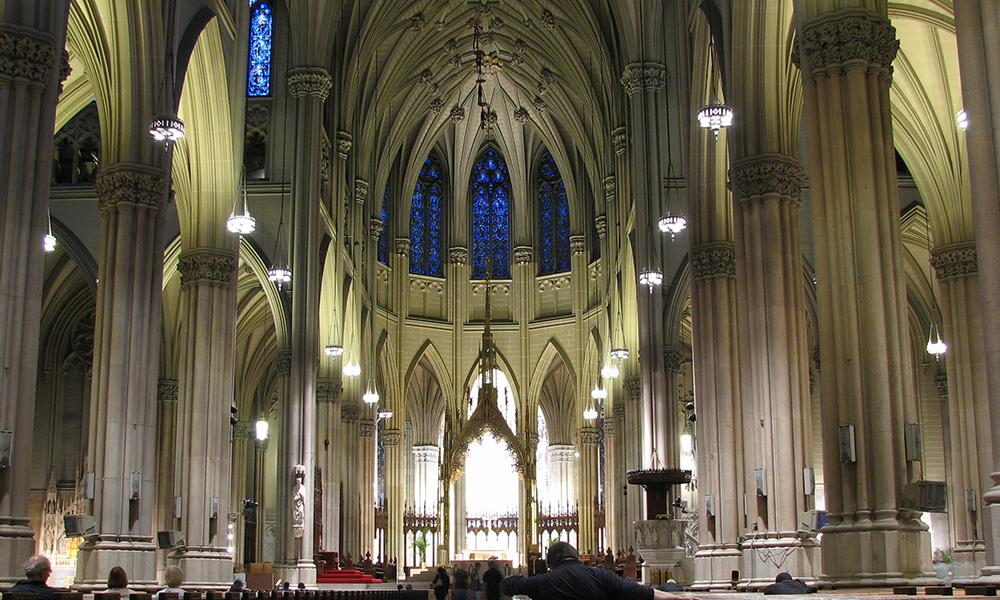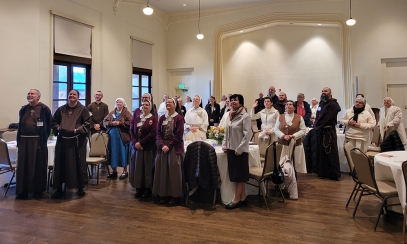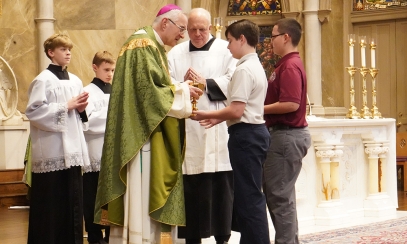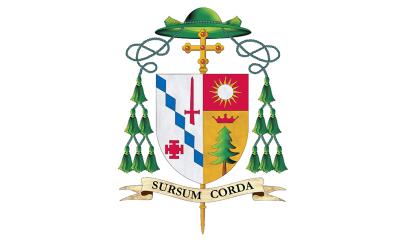
August 29, 2021 homily
Hear with your hearts and your minds.
Hear with your hearts and your minds.
My brothers and sisters in Christ:
This weekend, we return to our journey in Mark’s Gospel picking up where we left off with a very pointed lesson from our Lord. What precisely is our motivation for being here? Why do we come week after week?
We easily notice the external acts and rituals of our Mass, a source of some criticism of any person who says they are a Catholic. Still, we carefully guard against equating religion with performing merely external acts and rituals as though they are something superstitious or magical. Religion is something more than going to church, saying prayers, abstaining from meat on Fridays, or following the commandments. These things do not guarantee eternal life.
What counts is not what we do – but the desire and love in our hearts that motivates us to do what we do. In that sense, there is something that “comes before” to see what it is we are doing and the reason why. The awakening that happens is one that opens us to what is truly before us.
Our readings point out the lighted path for our understanding of this great gift.
A key word in the first reading from Deuteronomy is the word “Hear.” “Hear” in the sense of open your hearts and minds to the Lord’s teaching with the goal “that you may live.” Our humanity cries out for life and wants to live. Diligently observing these teachings indicates a certain wisdom and intelligence that will help us attain our ultimate destiny.
In other words, we cannot attribute to ourselves or our human genius that which only belongs to God. Some today want to build a world in which only human genius is acknowledged where there is no place for God. Recognizing the role and place of God is something that does not take away from our humanity but enlarges it. There’s a compelling image that I saw visiting St. Patrick’s Cathedral in New York City a few years ago that illustrates this point. The Cathedral is on Fifth Avenue right across the soaring towers of the Rockefeller Center, a tribute to human genius and effort. In fact, in the plaza across from St. Patrick’s, visitors are greeted by an enormous statue of Atlas, the Greek god of endurance. He is crouched over revealing all his muscles as he supports the burgeoning weight of planet earth. Then, inside St. Patrick’s, back near Our Lady’s chapel in the apse, is a statue of our Blessed Mother holding the child Jesus, her Son … and there the child Jesus has the globe of the earth in one hand supporting it effortlessly. It is as if to say: “He has the whole world in His hands!” What a metaphor for the Christian life! We partner with Christ!
The second reading speaks of the welcome that is necessary for the word that has been planted in each one of us to save our souls. It is a word that is dynamic – “Be doers of the word and not hearers …” In other words, the “hear” that we heard from Deuteronomy, the first reading, is nuanced by a change of one’s heart. “Be doers” in the sense of “make it part of who you are." “Let the Word be alive in you and in all you do.” The works of charity allow us to witness the fact that the Word is alive within us and that we have “heard” and are observant.
The Gospel illustrates the challenge that Jesus faced when He noticed that more attention was given to external rituals and practices rather than the very heart and soul of why we do what we do. Like a veneer, it looks nice on the outside, but in reality, it is shallow and lacking in depth and value.
We find ourselves today here at this Eucharist – here as Catholics – and one of our great challenges is to keep asking ourselves – why do we do what we do? What is at the very heart of why I am here today? What is God’s Word saying to me today? In part, does it open us up to the Lord who tells us who we are?
All throughout our history, towering saints have been raised up. They give me a certainty that I long for in order to say: “Yes, I can do it. Yes, they knew who they were and to whom they belonged. Yes, every saint has a past – and every sinner a future” – drawn into that everlasting relationship with the Lord. While so many are quick to point out, “Look at the bad things that your disciples do,” we say: “Look at the good, the holy, the true and just things that disciples have done,” “Look at Christ,” “Look – [here’s] the Lamb of God who takes away the sin of the world.” That’s where it all began at the beginning of John’s Gospel with Andrew and John. They freely followed Christ in a way that would begin to be a place of hope in the time of despair, a place of love in the time of hate, a place of life when all seemed lost. To whom do I belong?
For me, I remain with Christ because I have met Christ!
Oscar Wilde, the writer, who reportedly lived a rather ambiguous life and became Catholic at the end, had this line that has touched me as I think of all that we must do going forward: “How else but through a broken heart may [the] Lord Christ enter in?”
So many broken hearts, denials, and betrayals through history. The brokenness we have is the portal through which light of Christ can shine and raise us up to a new hope. It just takes a crack, a wound for the light to come in. Everything we do humanly can help but at the end of the day it will be insufficient. It takes something well beyond our power to generate a new hope. It will be when we encounter the One who can lift us up and restore us and give us the strength – not to keep looking back at sin and grave errors, but forward in hope to the wonder of what Christ can do with our brokenness through His loving gaze.
What will it take? I remember helping with a retreat for collegians some years ago. I vividly recall a coed who approached me and said, “Monsignor, I really want to become a saint!” She wasn’t looking back at what was wrong. She wasn’t caught up in the rhetoric for or against religion or church. She merely stated, without provocation, what was her heart’s desire. That just astonished me because, up to that point, no one had ever said something like that to me before. Most of us try to do what we think is good. But we get tired, and boredom sets in. We treat our faith like going to class. You remember: Sometimes we would say to the teacher or professor: “What’s the least I can do to get by? – to get that C.” Try to tell that to the coach! You’ll be shown the door pretty quickly. Walking down the path of holiness is a walk down the path in which I become truly myself – genuinely human as the Lord made me – and fulfilling the dream that God has for me. God doesn’t say, “What’s the least I can do for you?” He showed us “the depth of His love.” I am called to do that as well – for Him.
What happens then is that others meet the “something more” and say, “I don’t know what it is – but you have something that I want.” There’s an attraction.
When we hear the words of our readings summoning us to “hear” God’s Word so that we may live or be “doers” of the word and not “hearers” only, that somehow living our lives in obedience to what we have experienced or not do things without a reason, by keeping our hearts close to the very heart of Christ, I am prompted to ask myself: “What is it I truly give my life for? What is it that I hold most dear?” After all, He has us in the palm of His hand.



